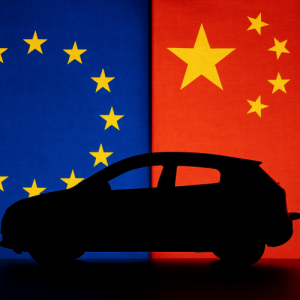As China and the European Union edge closer to a pricing mechanism for EV exports, the question is no longer whether competition exists but how to shape it responsibly. Behind the headlines of tariffs and anti-subsidy probes lies a more nuanced story of competition, collaboration, and industrial transformation. Recent remarks by Chinese and European stakeholders suggest that, despite frictions, both sides are steering towards a more balanced, pragmatic relationship in the EV sector—one grounded in what German industry insiders call “co-opetition”.
The latest signal came during the 2025 Global New Energy Vehicle Cooperation Forum held in Shanghai, where Zhang Lin, Chief Representative of the German Association of the Automotive Industry (VDA) in China, said that technical negotiations on the EU’s anti-subsidy probe into Chinese-made EVs have been “basically completed”. Zhang’s comments echoed earlier statements from both Chinese and EU officials expressing a willingness to reach a compromise.
From Confrontation to Negotiation: Signs of De-escalation
The dispute traces back to October 2023, when the European Commission launched an anti-subsidy investigation, accusing Chinese EV manufacturers of receiving excessive state support and undermining fair competition. The backdrop: China’s rapid rise as a global EV powerhouse, with its exports capturing around 25% of the EU’s EV market by 2024.
The EU responded with plans for steep tariffs on Chinese EV imports, triggering warnings from the industry about potential supply chain disruptions and higher costs for European consumers. In April 2025, China’s Ministry of Commerce confirmed that both sides had agreed to restart negotiations on price commitments—a technical pathway often used to avoid escalating trade conflicts.
By June 2025, after multiple rounds of dialogue, including a video meeting between Chinese Commerce Minister Wang Wentao and EU Trade Commissioner Maroš Šefčovič, the technical aspects of the deal were nearly finalized. Both sides emphasized the need to “work towards each other”, particularly in preparation for the upcoming China-EU summit in Brussels (24-25 July 2025)—a key milestone coinciding with the 50th anniversary of diplomatic ties.
“Co-opetition”: A Pragmatic Path Forward for the Auto Industry
Beneath the surface of trade tensions, the automotive sector is undergoing profound change. China is no longer just the world’s largest auto market—it is also the largest manufacturing hub and a key source of EV innovation. As Zhang Lin noted, Chinese firms increasingly export not only vehicles but also electrification and intelligent driving technologies, while German companies contribute engineering expertise and global sales networks.
This evolving dynamic marks a departure from the traditional “market-for-technology” model that dominated China’s early automotive partnerships. Instead, a new pattern of mutual benefit is emerging, where both sides leverage their comparative advantages to jointly develop products for global markets.
Examples of this can be seen in recent “reverse joint ventures”, where Chinese companies bring advanced EV platforms to Europe, while European brands contribute quality standards, branding, and distribution channels. The collaboration goes beyond production—it extends to R&D, supply chains, and increasingly, standard-setting for the future of mobility.
Breaking the Zero-Sum Mindset: Embracing Mutual Benefit
While competitive pressures are real, industry leaders like Zhang Lin emphasize the importance of mindset. “Avoiding a zero-sum mentality and embracing technological cooperation” is key to navigating current challenges, he argues .
The alternative—an escalating trade war—would risk fragmenting supply chains, inflating costs, and delaying the global green transition. More importantly, protectionist reflexes may distract from the deeper industrial shifts underway, where success hinges not only on price competition but also on innovation, brand reputation, and localized strategies.
Zhang draws inspiration from Germany’s own competitive culture. Despite fierce rivalry among German automakers like Mercedes-Benz, BMW, and Audi, they consistently advocate for open markets and respect for competitors. This “co-opetition” ethos, balancing competition with strategic collaboration, offers a valuable reference for Chinese EV makers expanding abroad.
Localization: The Next Frontier for Chinese EVs
One of the critical lessons for Chinese automakers is the importance of localization. Relying solely on cost advantages is no longer sufficient in mature markets like Europe, where consumers demand quality, safety, and environmental standards—and where political scrutiny over foreign imports is intensifying.
Chinese EV giants venturing overseas must prioritize local partnerships, invest in regional R&D, and adapt products to meet the preferences and regulatory frameworks of host markets. This “localization-first” approach not only helps navigate trade barriers but also fosters goodwill and deeper economic integration.
Looking Ahead: Trade Talks as a Turning Point
The ongoing EV dispute represents more than a bilateral trade skirmish—it is a test case for how China and Europe manage competition in strategic industries while preserving space for cooperation. The upcoming China-EU summit provides a crucial deadline to demonstrate progress.
Beyond resolving this specific case, both sides have broader incentives to prevent economic fragmentation. With global supply chains under strain, the need for stability, innovation partnerships, and joint responses to climate change has never been greater.
If the EV dispute concludes with a balanced, pragmatic agreement, it could serve as a blueprint for addressing future trade frictions—proving that even amid geopolitical headwinds, co-opetition remains not just possible, but essential for shared growth.


